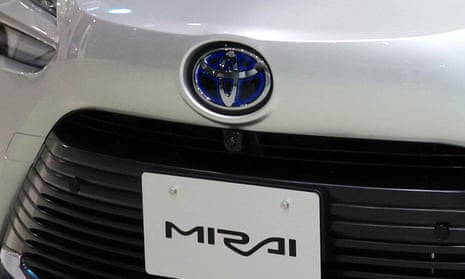
Toyota accused of greenwashing in Greenpeace complaint filed to ACCC
Complaint focuses on claims about performance of vehicles and net zero by 2050 plans while company says it is committed to sustainable future
Greenpeace Australia Pacific has asked the Australian Competition and Consumer Commission to investigate whether environmental claims by Toyota are misleading or deceptive.
The greenwashing complaint, filed Friday by the Environmental Defenders Office on behalf of Greenpeace, focuses on claims about the environmental performance of Toyota’s vehicles and its net zero ambitions.
It comes a day after the competition watchdog signalled it would step up its probe of companies’ claims about their environmental credentials after a survey of 247 businesses and brands found more than half had made misleading statements.
A spokesperson for Toyota Australia said the company was committed to achieving a sustainable future and rejected any claims to the contrary.
“Toyota Australia has a long track record in helping customers reduce their vehicle emissions, including through the supply of over 315,000 hybrid-electric vehicles and investment in reduced tailpipe emissions vehicles and carbon neutral technologies,” they said.
Greenpeace’s complaint includes allegations Toyota’s net zero by 2050 plans are contradicted by its car production plans and the company was not seeking a rapid transition to electric vehicles and had lobbied globally to halt, weaken, or delay vehicle emissions standards.
It also alleges the company’s Mirai cars were unlikely to be powered by green hydrogen in Australia and therefore could not be considered low emissions vehicles and that Toyota’s hybrid vehicles were not “self-charging” because they still required petrol.
In 2020, a Toyota advertisement for its self-charging hybrid was banned in Norway for being misleading to consumers.
The company has also faced legal challenge in Australia over defective diesel particulate filters.
Lindsay Soutar, director of Greenpeace Australia Pacific’s electrify campaign, said: “We believe Toyota Motor Corporation’s advertising is misleading Australian consumers by understating its cars’ emissions and overstating its commitment to clean transport.
after newsletter promotion
“Toyota Motor Corporation makes claims in its advertising that give the false impression the company is leading the transition to clean cars, but the truth is Toyota is not leading the transition but is acting globally to block the take-up of electric vehicles.”
Kirsty Ruddock, managing lawyer at the Environmental Defenders Office, said consumers and, increasingly, corporate regulators, were holding corporations to account for misleading practices.
“If companies like Toyota continue to behave in this manner, they run the very real risk of eroding their social licence and seriously damaging their brand and their customer base,” she said.
A spokesperson for the ACCC said the regulator would consider the complaint filed by the EDO on Friday morning.
“Greenwashing is a priority for the ACCC and we are currently examining a number of concerns about greenwashing involving a range of industries,” they said. They said the regulator did not comment on potential investigations.